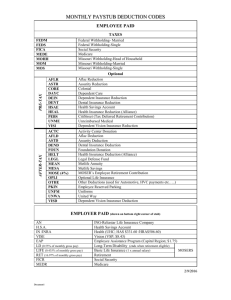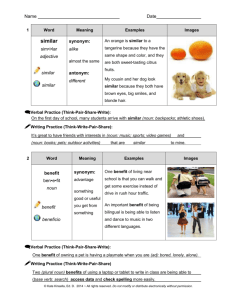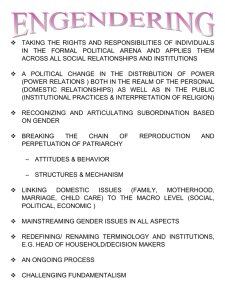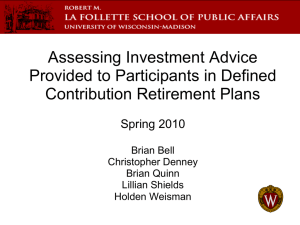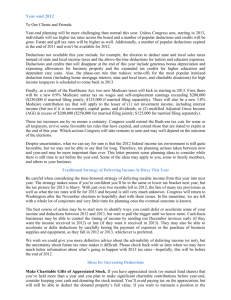December 2014
advertisement
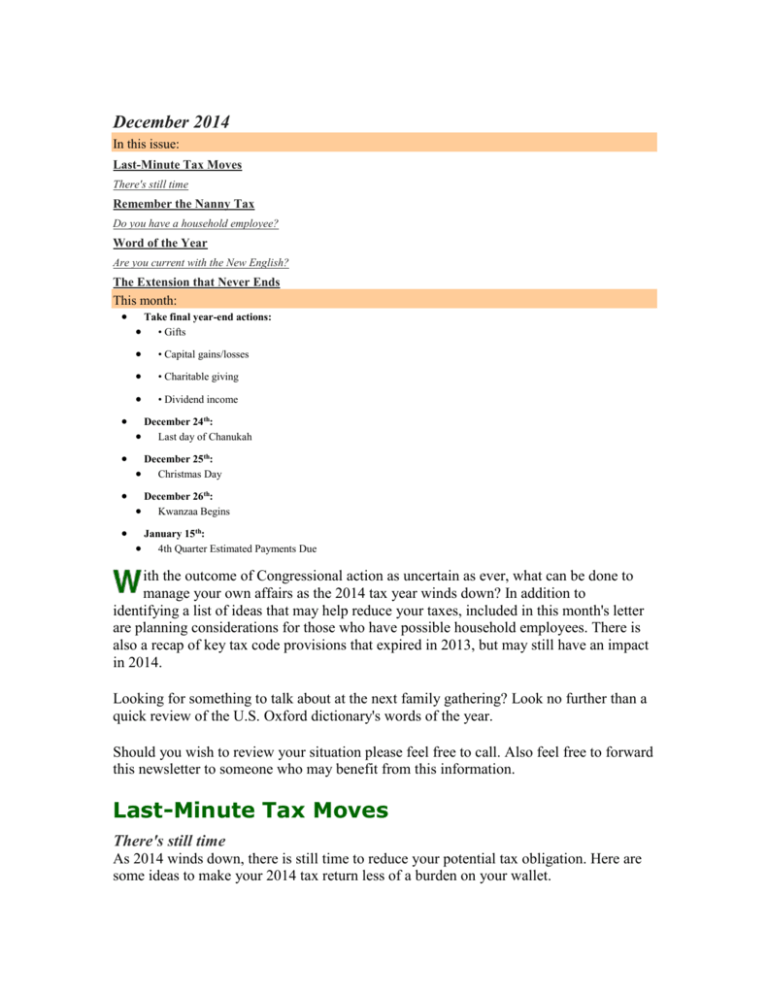
December 2014 In this issue: Last-Minute Tax Moves There's still time Remember the Nanny Tax Do you have a household employee? Word of the Year Are you current with the New English? The Extension that Never Ends This month: Take final year-end actions: • Gifts • Capital gains/losses • Charitable giving • Dividend income December 24th: Last day of Chanukah December 25th: Christmas Day December 26th: Kwanzaa Begins January 15th: 4th Quarter Estimated Payments Due ith the outcome of Congressional action as uncertain as ever, what can be done to manage your own affairs as the 2014 tax year winds down? In addition to identifying a list of ideas that may help reduce your taxes, included in this month's letter are planning considerations for those who have possible household employees. There is also a recap of key tax code provisions that expired in 2013, but may still have an impact in 2014. Looking for something to talk about at the next family gathering? Look no further than a quick review of the U.S. Oxford dictionary's words of the year. Should you wish to review your situation please feel free to call. Also feel free to forward this newsletter to someone who may benefit from this information. Last-Minute Tax Moves There's still time As 2014 winds down, there is still time to reduce your potential tax obligation. Here are some ideas to make your 2014 tax return less of a burden on your wallet. Defer income or accelerate expenses. Remember individual taxpayers are on the "cash basis" of accounting for income tax purposes. That means your income is taxable when you receive it and expenses count when you pay them. With this knowledge consider making deductible payments prior to the end of the year. Examples could be property tax payments, mortgage interest payments, and charitable donations. Shift the expense or revenue into the tax year that will be most beneficial for your tax situation. This review is especially important if you are nearing retirement. Give to charities. Consider making end of year donations to charities of your choice. Remember donations of property in good or better condition and your charitable mileage are also deductible. Receiving proper documentation that acknowledges your contributions is important to ensure you obtain the full deduction. Consider donating appreciated stock. By donating appreciated stock owned one year or longer to a favorite charity, you receive two benefits. First, you will not have to claim the capital gain on the appreciation of your investment. Second, you can claim the higher market value of the stock as your contribution amount. The procedure you need to follow to qualify your donation of appreciated stock is fairly strict. Ask for help from your broker and the charitable organization to ensure it is done correctly. Consider gifts. Each year you may gift up to $14,000 without tax consequences to as many individuals as you choose. Consider any gift giving you wish to make up to the annual limit. This could include gifts of cash or property, including investments. Make effective use of capital losses. Remember up to $3,000 in net capital losses can be claimed each year. This loss limitation is calculated after netting all your capital losses against any capital gains. By careful planning you can take advantage of this loss amount each year. Fund tax-deferred retirement accounts. An easy way to reduce your taxable income is to fully fund retirement accounts that have tax-deferred status. The most common accounts are 401(k)s, 403(b)s, and various IRAs (Traditional, SEP, and SIMPLE). Retirement account distributions. If you are over the age of 59 you will want to review whether taking distributions from your retirement plans makes sense. This is especially important if you are over the age of 70½ when required minimum distributions (RMD) must be made. Remember, removing a planned amount from your retirement accounts each year may be more tax efficient than waiting until you are "required" to do so using the RMD rules when you are older. This is a short list of some of the ideas you can use to lower your tax obligation in 2014. If interested, call to review your situation. Remember the Nanny Tax Do you have a household employee? The "nanny tax" refers to the part of the tax code that deals with household workers that are treated as employees. The nanny tax rules require you to withhold Social Security and Medicare taxes for any household employee that earns $1,900 or more annually. Who it applies to Household employees include baby sitters, house cleaners, yard workers, and general labor that are not incorporated. It does not apply to companies that work around your home. Steps to take If you have suppliers that work for you, you need to find out if they work for themselves (soleproprietor) or whether they are organized as a business entity like an S-corporation, C-corporation or Limited Liability Company (LLC). If your help is not incorporated and you expect to pay them in excess of the threshold, please obtain the household employee's Social Security number and then file the necessary tax forms to withhold the proper amounts. Should you need assistance with this please call. Word of the Year Are you current with the New English? Each year the Oxford Dictionary announces a new word of the year. This word exemplifies changes in society and shows the continuing evolution of the English language. As the year wraps up, here is a look back at the words of the year for the past decade. How many do you know? Which of them do you use in your everyday speech? Enjoy. Year Oxford Dictionary U.S. Word of the Year Definition 2005 podcast (noun) A digital audio file made available on the Internet for downloading to a computer or portable media player, typically available as a series, new installments of which can be received by subscribers automatically. 2006 carbon-neutral (adjective) Making no net release of carbon dioxide to the atmosphere, especially through offsetting emissions by planting trees. 2007 locavore (noun) A person whose diet consists only or principally of locally grown or produced food. 2008 hypermiling (noun) The practice of making adjustments to a vehicle or using driving techniques that will maximize the vehicle's fuel economy. 2009 unfriend (verb) Remove (someone) from a list of friends or contacts on a social networking website: she broke up with her boyfriend, but she hasn't unfriended him 2010 refudiate (verb) used loosely to mean 'reject': She called on them to refudiate the proposal to build a mosque. [origin -- blend of refute and repudiate] 2011 squeezed middle (adjective/noun) The section of society regarded as particularly affected by inflation, wage freezes, and cuts in public spending during a time of economic difficulty, consisting principally of those people on low or middle incomes. 2012 GIF (noun) A lossless format for image files that supports both animated and static images: [as modifier]: a GIF image. Derived from; graphic interchange format 2013 selfie (noun) A photograph that one has taken of oneself, typically one taken with a smartphone or webcam and shared via social media. Source: Oxford Dictionary And the winner for 2014? Verb - Inhale and exhale the vapor produced by an e-cigarette or similar device. This word was introduced to describe the act of inhaling vapor from e-cigarette products since the word "smoke" does not correctly apply to these high-tech devices. Look for new "non-vaping" signs at establishments near you. The Extension that Never Ends With the potential for retroactive tax law changes in 2014, please prepare for the extension of the following tax laws that expired in 2013. This expiration and extension treadmill has been going on for years. And while there is no guarantee that changes will be made, by being prepared with the proper documentation you can take advantage of any forecasted law changes. Educator's $250 tax deduction If you are a teacher and have outof-pocket expenses please keep your receipts. You may be able to deduct up to $250 of qualified expenses even if you do not itemize deductions. State sales tax itemized deduction option Keep receipts of any large purchases. The sales tax provision allows for you to take either a general sales tax deduction or a state income tax deduction as an itemized deduction. Direct contribution from retirement accounts for qualified seniors In 2013, qualified seniors who donated funds directly from their retirement plan could exclude the plan withdrawal from income. Hold off using this technique in 2014 until you receive confirmation from Congress this tax benefit is extended. Itemized deduction for mortgage insurance premium costs Keep your mortgage insurance documentation for a potential itemized deduction. Changes in small business depreciation Through late November, 2014 there is no longer bonus first year depreciation. In addition Section 179 amounts are greatly reduced from $500,000 in qualified assets to $25,000. Even if the law changes, you have little time to purchase and install equipment. Please plan accordingly.
